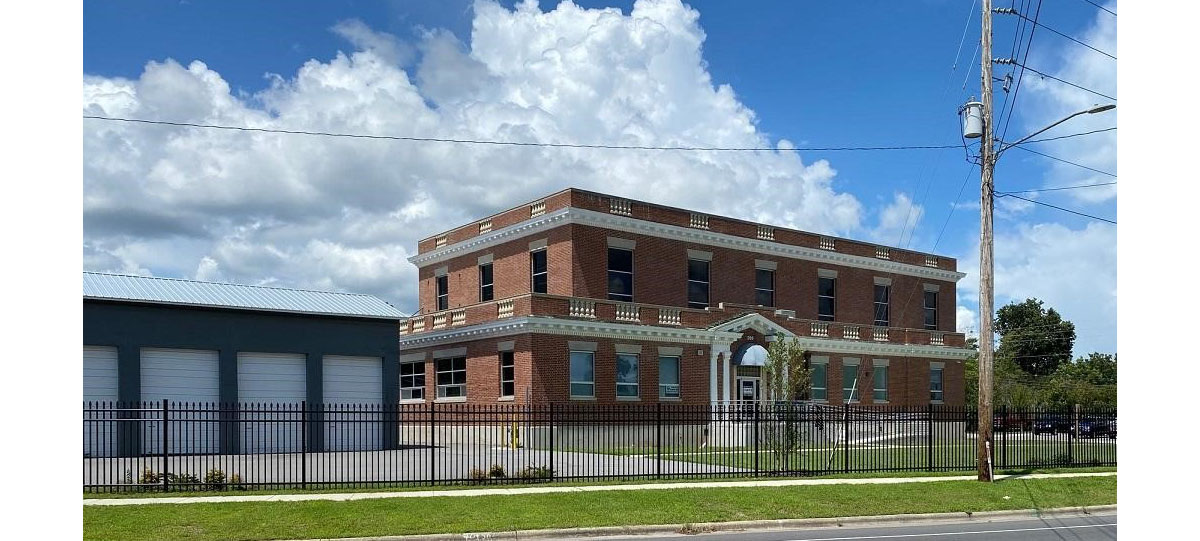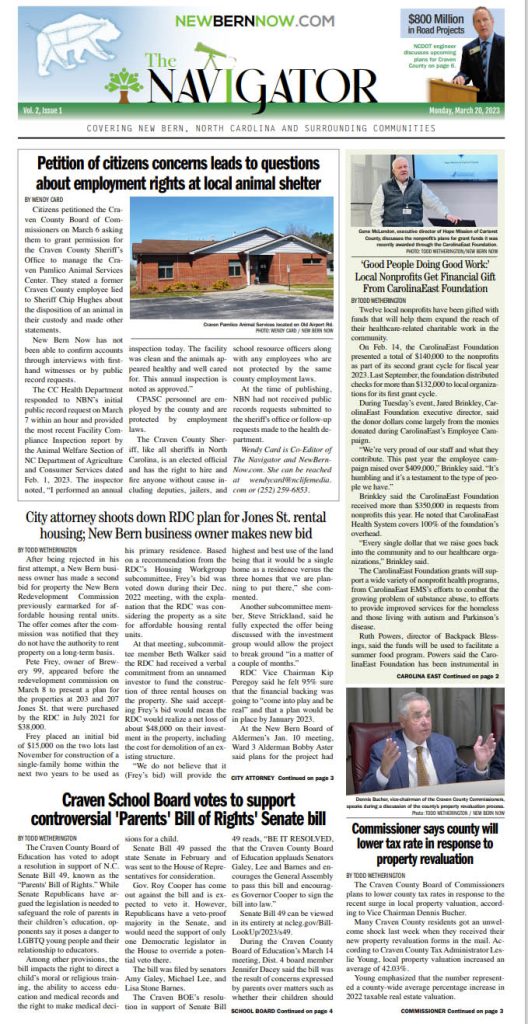
Sunday Reader, which debuts today, is a curated collection of what people were talking about in New Bern this past week. It appears first thing Sunday mornings.
The VOLT Center is an acronym in search of a meaning. Or it’s a stylized word that harkens to a previous use of the facility as the city’s electrical generation plant.
The old power plant is bordered by Country Club Road, First Street, Spencer Avenue, Park Avenue, and Rhem Street. It was an eyesore being used as storage and a fueling station.
After Dana Outlaw was elected mayor in 2013, the city embarked on a plan to rid itself of surplus properties and make better use of the properties it was keeping.
Any thought of selling the old power plant property would be dispelled by an environmental report, so city leaders latched on the idea of turning it into a farmers’ market, but they couldn’t get buy-in from the existing farmers’ market downtown, nor downtown businesses that didn’t want the farmers’ market to move from South Front Street.
So instead, the city partnered with Craven Community College, which started offering vocational classes from a renovated main building. More than 1,000 students have completed vocational training there, with about 1 in 5 being offered jobs in their fields before they graduated.
The college has expanded from the main building to the old garage, where it now teaches engine repair, and the brick building at the corner of Rhem Street and Park Avenue, where it teaches police skills.
The college now has its eyes on another building where it wants to teach restaurant food service skills up to but excluding chef.
There’s a shortage of restaurant workers across the nation, and New Bern is no exception, but for some reason the college believes that by having people go through a formal education, that will help address the problem.
Time will tell; there aren’t enough restaurant workers available who are willing to go through on-the-job training, much less pay the expense of going through a program that lasts several weeks. There is also the question of whether restaurants will pay people who have this training more than they pay those without it.
The Board of Aldermen approved the college’s plan on a 4-3 vote on Tuesday, with aldermen Jameesha Harris, Johnnie Ray Kinsey, and Barbara Best voting against it.
It needs final approval from the Economic Development Administration.
For the three aldermen who voted against the proposal, their issue is that the original plan called for a restaurant commissary on the campus that would be used by food trucks as a home base. They need that home base in order to secure health department approval and inspections.
City Manager Mark Stephens said the city has been trying to get a restaurant commissary off the ground for a couple of years without success. The college, on the other hand, has the funding somewhere around $200,000 to equip a restaurant laboratory and get it running by this summer.
The rub is that if the college uses it to teach, the facility can’t be used for commercial purposes, and the idea of it being a home base for food trucks is effectively killed. Harris, Kinsey, and Best oppose the change in scope.
Craven Community College President Ray Staats said the college has been developing the idea of a restaurant teaching facility for three years, although many on the Board of Aldermen say Tuesday was the first they’d heard of it. There were no supporting documents included in the aldermen’s packets.
Staats read from a prepared statement on Tuesday and allowed copies to be made for the aldermen, but no copies have been made public so far.
The issue sparked conversation even as the Tuesday Board of Aldermen meeting was being live-streamed.
Talina Lynn said, “The original vision included entrepreneurship, growing food/partnering with local farms, and a city market to sell community products.
“I’m curious how many elected officials are in the hospitality industry that would benefit from the service workers created by this program? Because creating additional food industry entrepreneurs is considered competition maybe?
“Seems those additional back door meetings worked. Politics-100, Community-0.“
Diane Marr replied, “Not politics, practicality. CCC has the money, in hand, the staff and ready to go. Not going to cost the city (& taxpayers) a dime. The Farmers Market has repeatedly stated they want the market where it is downtown. In a city the size of New Bern, 2 Farmers Markets are too much. Food Trucks are great, entrepreneurship is great…….there is the SBA, already there.”
Lynn said, “While CCC has an abundant source of income through our youth’s financed future, the original vision was to incorporate the communities’ need for additional entrepreneurial hospitality space. If the plan changed, the community should have been notified like the presenter was in order to prepare for tonight. Additionally, considering the community statistics surrounding the VOLT Center were used to promote its inception, who also aren’t typical participants in the beloved downtown farmers market (which commonly suffers from limited space), why shouldn’t their voices be heard regarding these intended, last-minute changes? 2 Farmers Markets is as practical as 2 gyms, or 2 schools, or 2 gas stations. Because there is more demand than supply for another outlet, closer to additional communities prone to transportation issues.”
I serve as the Ward 2 Alderwoman for the City of New Bern’s Board of Aldermen. I am writing out of concern for my experience at the April 13, 2021 City of New Bern Board of Alderman meeting regarding the 4-3 decision to change the scope of work on the City Market/VOLT Center. When the original planning meetings were conducted regarding the grants and funding needed to build and operate the City Market/VOLT Center on First Street, there were many community representatives at the table at the CCDRA in the O. Marks building. Some vital and trusted community reps included Corey Purdie (WashAway Unemployment/Catalyst Kitchen) and Lovay Wallace-Singleton (Veterans’ Organic Garden), were still at the table. I also remember that the original vision included entrepreneur education, growing food, partnering with local farmers, and a City Market to sell community products. Craven Community College President Dr. Ray Staats’ presentation at Tuesday’s BOA meeting was the first time that I or the public had been notified that those plans had changed. The concept of the City Market was born from the 2-year Choice Neighborhood Planning Initiative that was funded with a $400,000 grant from HUD to revitalize the Greater Duffyfield community. Over 1,800 citizens were involved in that planning process, and the City Market was born from that effort. If you have not read the plan, I invite you to do so. The community truly created the plan for the betterment of all New Bernians. (link to plan: https://choicenewbern.com/)
Choice Neighborhood Initiative Planning. HUD launched the Choice Neighborhood Initiative (CN) program in 2010 to help local leaders transform struggling neighborhoods of concentrated poverty into sustainable, mixed-income communities of choice. New Bern is one of only 9 planning grant recipients nationwide for 2013! choicenewbern.com
Understandably, here are my concerns as an elected official of residents close to this facility that stand to gain the most from its education, trades, and potential for economic advancement. While Craven Community College has continued to be a vital community partner in our city’s efforts to educate our citizens, properly prepare our workforce, and deliver specific entrepreneurial results, the original vision expressed to our city residents and promoted in the primarily minority and underserved neighborhoods closely located to the City market/VOLT Center was to incorporate horticulture (in a known food desert) and the communities’ need for additional entrepreneurial hospitality space (for food preparation and sale). If that plan changed, the community must be engaged in any change of direction or vision and should have been notified, just like Dr. Staats was engaged and able to prepare for Tuesday’s meeting. It was expressed in the meeting by the City Manager that the kitchen aspect of this project had sat idle for 2 years, hence the City’s decision to receive a presentation from the college. However, the community was unaware of any attempt to change the original plan and vision of the City Market safely following the COVID pandemic while still reeling from the impacts of Hurricane Florence. This secrecy extended to several Aldermen themselves representing the community served, as they were unaware of any proposed changes to the original vision of the City Market Program. Additionally, The City Manager would not disclose who’d given him the direction to have Dr. Staats present or who gave direction to call the EDA to request this major change in scope. These actions seem highly suspicious and disingenuous to a community that continually sees resources promised and never delivered (such as Stanley White). Additionally, the population demographic (low-income and lack of transportation) surrounding the City Market/ VOLT Center that were used to promote its funding and development are not participants in the Downtown Farmers Market which commonly suffers from limited space and diversity (according to testimonials from local minority entrepreneurs). Why shouldn’t their voices be heard regarding these intended, last-minute changes?
Although we hear the consistent argument of “why are two markets necessary for a small town like New Bern?”, two farmers’ markets are just as practical as two gyms, or two schools, or two gas stations in any town. There is more demand than supply for another outlet to provide live-action entrepreneur events that have the opportunity to create capital and jobs closer to marginalized communities prone to lack of opportunity and transportation issues. Creating programs that empower people to grow fresh food, from which healthy recipes can be crafted in a community (commercial) kitchen, in a clean facility which creates local jobs through maintenance and training in food prep, with an opportunity to sell in an open community market and stabilize income potentially lost through a global pandemic is empowering to a community that at times feels powerless to political influence and lack of access to power and resources.
The Small Business Center is a great partner for training and education, but the buck stops at capital creation, which is essential to budding entrepreneurs and incentivizes progress. And while some officials believe it is just practical to have the college (with its wealth of resources) take over this school-to-kitchen pipeline, practicality it is only beneficial for the business-driven individuals with an agenda for their bottom line; because empowering communities to be owners and creators and not just workers, takes the politics out of the community vision and promotes the greater good. Additionally, it is not lost on this community that some elected officials who voted in favor of this move are in the hospitality industry and would benefit from the service workers created by this program.
The vote to change the vision of the City Market that evening was clearly down racial lines. Why? Maybe because creating additional food industry entrepreneurs is considered competition or a threat to the New Bern establishment, and it is just another example of the systemic racism inherent in the majority’s decision. We firmly believe now that the pandemic is becoming more manageable and people emerge from social isolation; we can meet the original community-centered vision of the City Market concept and create a thriving entrepreneurial market that will deliver on the promises made to this marginalized community identified in the CNI Plan. I ask for a review of this decision related to the original vision for the Volt Center, and I respectfully ask that the EDA not change the original community-supported vision of the City Market project.By Randy Foster




